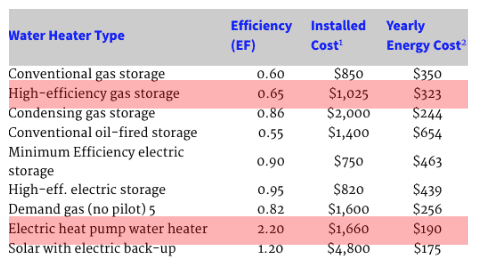If your home has access to natural gas, you might be wondering which water heater is better: a hybrid heat pump water heater or a gas water heater.
Well, it really depends on what’s most important to you: energy efficiency and saving money in the long run? Or comfort?
If comfort is more important, a gas water heater is your best option since it has a higher “recovery rate”. (Don’t worry, we’ll explain what that means below.)
However, if saving money (and energy) is more important to you, a hybrid heat pump is probably the best choice.
Now let’s take a closer look at both of these factors.
Gas water heaters provide better comfort
A gas water heater provides a higher level of comfort because it has a faster recovery rate.
The recovery rate of a water heater refers to the time it takes a water heater to reheat its entire supply of hot water. This is a huge advantage for homes that use large and frequent draws of hot water.
You see, the recovery rate of a water heater is based on its BTU (British Thermal Unit) input. BTU measures the amount of energy needed to heat one pound of water by one degree Fahrenheit.
For comparison’s sake, let’s look at the average BTU/hour input of both systems:
- Hybrid water heater- 6,000 to 8,000 BTUs
- Gas water heater- 32,000 to 50,000 BTUs
A hybrid heat pumps water heater’s low BTU input means that it would have a hard time keeping up if your household is accustomed to drawing large volumes of hot water at once (for example, running the dishwasher and washing machine while showering).
Let’s say your family is drawing hot water from a 40 gallon tank. Once the tank has been depleted you could be waiting for up to 8 hours until it can recover and provide a full tank of hot water again.
On the other hand, a gas water heater could recover a depleted 40 gallon tank in less than an hour. So, if you’re more concerned with having enough hot water and not running out, a gas water heater is best.
But…hybrid heat pump water heaters can be more cost effective
If you’re interested in saving money in the long run, a hybrid heat pump water heater is the better option.
You can see why when you compare the overall “life-cycle” costs of various water heater systems using this chart:
Note: While these figures are from 2012 you can still expect similar results from hybrid and gas water heaters available today.
Source: ACCEE
But why does a heat pump water heater save you more money in the long run?
Well, although heat pump water heaters often cost more upfront, they provide lower monthly heating costs because they require relatively little energy to operate.
According to Energy.gov, “an electric heat pump water heater might have lower energy costs because of its higher efficiency than a gas-fired conventional storage water heater, even though local natural gas costs might be lower than the electricity rates.”
Heat pump water heaters are more energy efficient because they move heat while gas water heaters create heat via combustion. And it always takes less energy to move heat than create it.
Note: If you want to keep your monthly heating costs as low as possible, keep your heat pump water heater in “Economy Mode”. This mode prevents the water heater from automatically switching to electric resistance heating during times of high hot water demand.
One last suggestion: If energy efficiency and saving money is your main concern, you may also want to look into a gas tankless water heater. These units use gas to heat only the water you need at any given moment. To learn more about how they can save you money, check out our article, “Tankless vs Hybrid Heat Pump: Which Water Heater is Better For My AZ Home?”
Want professional advice? Ask a Phoenix plumber
The best way to determine the right water heater system for you is to chat with a professional.
Still have questions on your next water heater purchase? We’re here to help.
Just contact us today and we’ll be happy to walk you through your options.

